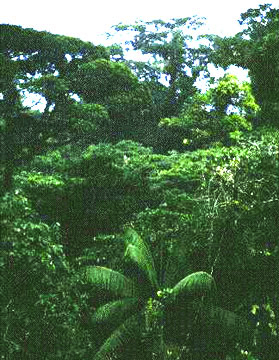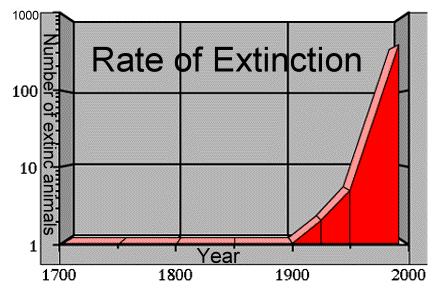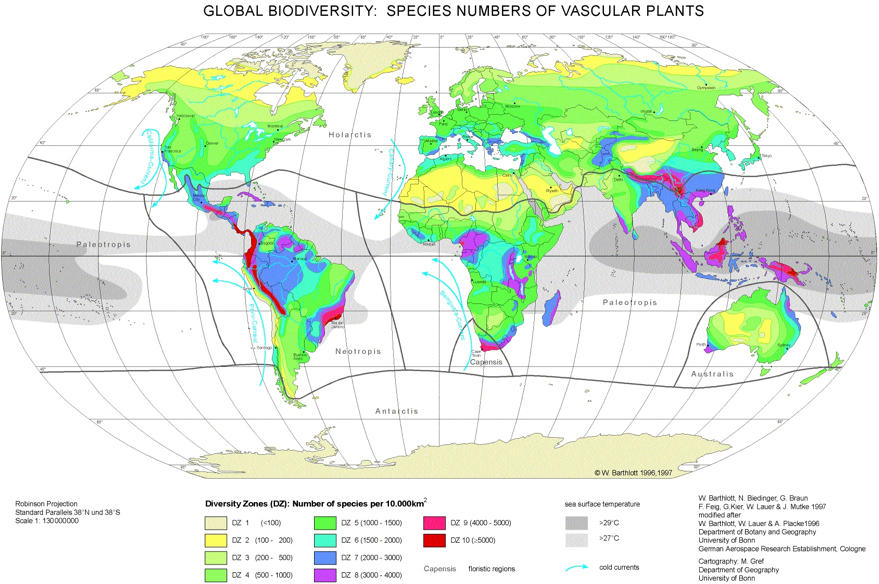Navigating the site:
Diversity
"where the worst crime is ignorance."
C. P. Snow, (1958) p. 48.
The extinction of creation
"We do not know to within one or two orders of magnitude how many species are on the planet. This is a scandal."
p. 276.
Ways of conserving wild space are elusive but affordable.
Human consumption and demographic success has brought world diversity to a tipping point that will take 25 million years to remedy if biodiversity is to regain lost ground.
Where the numbers are | rates of extinction | question of relevance | Stearns' warning | sources
based on tropical canopy studies of insects and birds estimates of the diversity range from 20 to 30 million to 50 million to 100 million based on studying isolated preserves of natural conditions. . . in Tambopata, (1988) Selva Verde, or Panama (1980) .
André and other counting mites raised the estimates to such a high number.
| Yet anomalies arise. | ||
|---|---|---|
 |
||
"If this is true (100 million species) then most of the species on the planet are beetles and mites living in the canopy."
"On a single tree at Tambopata Erwin found as many species of ants as there are in the British Isles. " |
||
| Costa Rican canopy forest | ||
"The solution to this problem is more, better systematics and taxonomy, fields that have been neglected over the the last 50 years in favor of more glamorous areas like molecular biology."
"No one really knows how fast species are going extinct "
p. 270.
"The entire estimation procedure is fraught with difficulty, for it is very hard to say when a species has really gone extinct."
"Of the birds endemic to Hawaii before the arrival of the Polynesians, at least 68% are now extinct, about which half disappeared before the arrival of Captain Cook."
p. 270.
"The causes were hunting, habitat destruction, and introduced enemies."
p. 271
"These two introductions make clear what catastrophes can result from well-meaning people with no notion of ecological consequences." Predatory land snails on Pacific Islands & Nile perch fish.
p. 271.
Where the numbers are | rates of extinction | question of relevance | Stearns' warning | sources
![]()
What difference does the loss of biological diversity mean to human self interest?
"It is not a question for the natural sciences, except to the extent that they can demonstrate probable consequences for human health and well-being resulting from the extinction crisis. I doubt that there are many such consequences. Far too many wild threats of ecosystem collapse and the disappearance of oxygen from the atmosphere have been made."
P. 271.
Stephen C. Stearns
"My own opinion is that through gross negligence, without being able to imagine, understand, or intend what we are doing, the human race is causing the mass extinction of millions of species that have never done us any harm. Only plate tectonics and meteorite impacts have had effects of equivalent magnitude."
p. 272
Where the numbers are | rates of extinction | question of relevance | Stearns' warning | sources
Wild Soundscapes–Bernie Krause's sensor-expanding
" In 1968, it took fifteen recording hours to get one hour's worth of natural sound. … Now, due to human noise and disturbed habitats, it takes about two thousand recording hours to get the same result. About 2 percent of our old growth forests remain standing in the lower forty-eight states, down from 45 percent just thirty years ago. . . .Over 25 percent of the North America natural soundscapes in my archives were recorded in habitats that have since become extinct; many vital natural soundscapes no longer exist–except on tape."
David Petersen On the Wild Edge: In Search of a natural life. (Henry Holt: New York, 2005.), pp. 130-131.
"Because scientists have yet to put names on most kinds of organisms,
and because they entertain only a vague idea of how ecosystems work, it
is reckless to suppose that biodiversity can be diminished indefinitely
without threatening humanity itself.
Field studies show that as biodiversity is reduced, so is the services provided by ecosystems.... These services are important to human welfare."
The Diversity of Life. p. 347-48
"Only in the last moment of human history has the delusion arisen that
people can flourish apart from the rest of the living world."
p. 349
Where the numbers are | rates of extinction | question of relevance | Stearns' warning | sources
"Thus, remarkably, we do not know the true number of species on earth, even to the nearest order of magnitude. My own guess, based on the described flora and fauna and many discussions with entomologists and other specialists is that the absolute number falls between 5 and 30 million."
p. 5.
"In the end,suspect it will come down to a decision of ethics–how we value the natural world in which we evolved and now, increasingly, how we regard our status as individuals."
p. 16.
"Rain forests" are key habitats to protect biological diversity, as are coral reefs and the soil of forests and ocean floors.
pp. 8-9.
"Expansion and stewardship may appear at first to be conflicting goals, but the opposite is true. The depth of the conservation ethic will be measured by the extent to which each of the approaches to nature is used to reshape and reinforce the other. The paradox can be resolved by changing its premise forms more suited to ultimate survival, including the protection of the human spirit."
p. 16.
"Surinam, serene, a living treasure awaiting assay."
ibid.
Sources
Stephen C. Stearns "Biodiversity: A Review of the Scientific Issues," in Biodiversity in land-inland water ecotones.
By J. B. Lachavanne, Raphaëlle Juge, International Association of Theoretical and Applied Limnology. Congress. pp. 269-277.
David Petersen, On the Wild Edge: In Search of a natural life. (Henry Holt: New York, 2005.),
Biodiversity. Washington, D. C.: National Academy Press, 1988.
Where the numbers are | rates of extinction | question of relevance | Stearns' warning | sources
E. O. Wilson | What is biological diversity? | Diversity & Wilson | | Genes | Ehrlich | Nature subject index





